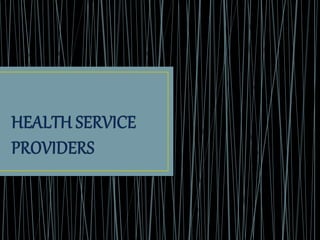Health service providers
- 2. - can be defined as any institutions or professionals who are accredited or licensed to practice health care under existing laws. - examples are hospitals and clinics and health care professionals such as doctors, nurses, medical staffs, counselors, psychologists, and the likes.
- 3. âĒ is a mechanism where people prepare for possible medical needs in the future and pay through a scheduled personal contribution or direct salary deductions. âĒ this composes the medical and dental coverage of individual including the amount and number of illnesses to be shouldered by the health agency or company.
- 4. âĒ are those areas or tools being used to deliver or practice health services. Commonly, these can be associated with hospitals, clinics, and health centers that may be public or privately owned by companies or individuals.
- 6. HOSPITAL
- 7. CLINIC
- 9. DRUG STORES
- 11. âĒ a major health care facility which provides preventive, diagnostic, curative, and rehabilitative treatment to patients.
- 12. âĒ PREVENTIVE as it may serve as a health-arm of Department of Health to release bulletins and advisories on how to avoid and manage any illnesses in the community. Hospital may also conduct seminars and fora in various barangays promoting healthy lifestyle.
- 13. âĒ DIAGNOSTIC as it has equipment to detect any forms of illnesses and its veracity. âĒ CURATIVE as health professionals perform the most sensitive to simple operations to treat the patients, they also prescribe medicines and medical management for complete healing.
- 14. âĒ REHABILITATIVE as it takes care of the delivery and restoration of normal functions of body parts.
- 15. âĒ the entry point of patients for the help of health professionals. Outpatient consultations, first aid, dental procedures, counseling, psychotherapy, immunizations can be performed in these facilities. Clinics like lying-in and dental are usually run by private practitioners while health centers are run by government.
- 16. âĒ These facilities house patients to provide short-term or long-term treatment of their general or specific condition which hospitals may not perform such as trauma, alcoholic, or drug addiction residential treatment centers, viral affected patients and many more.
- 17. âĒ These are accredited establishments that sell medicines and other medical goods or paraphernalia. These may be found in hospitals or as a separate entity being managed by a licensed pharmacist, medial technologists, staff, and technicians.
- 18. âĒ The health care facility where examination of specimens and laboratory tests are conducted to rule out any possible illnesses. Experts make also their experiments and clinical study here to understand the emerging virus and disease outbreak in the country.
- 19. âĒ PhilHealth a government agency that enjoins employees both in government and private to pay for their monthly contribution which will be used for their hospitalization. âĒ Health Maintenance Organizations (HMO) a type of health plan where individual company- employed or self-employed enroll to secure their hospitalization and other health expenses.
- 20. âĒ Health Insurance Plan there are people who opt to buy a health insurance plan which includes certain amount of money to be used during hospitalization. This cannot be used yet unless fully paid or if the provisions of the plan declare otherwise.



















